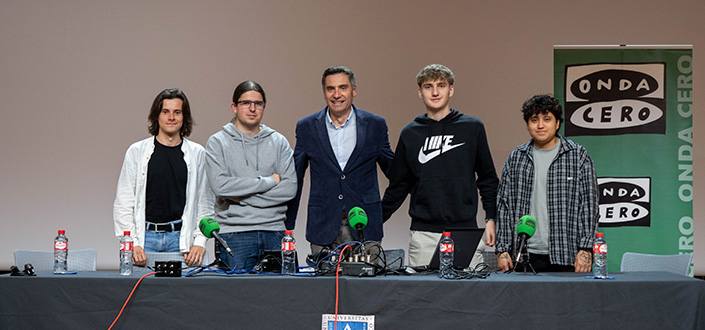The auditorium of the Universidad Europea del Atlántico (European University of the Atlantic, UNEATLANTICO) was the setting for Onda Cero’s live programme on 8 April. The event was attended by prominent members of the university, such as Roberto Ruiz, Ana Visiers, Juan Luis Vidal, Diego Lainz and Alvaro Velarde as well as the students of the Communication Degrees, Álex Martín, Álvaro Medina, Bonni Gamarra and Héctor D. Somonte.
The programme began with a presentation about the University in which Javier Barbero, presenter of Onda Cero, interviewed the Secretary General and Vice-Rector for International Relations, Roberto Ruiz, who highlighted the growth and consolidation of UNEATLANTICO, mentioning that the university already has three doctorates approved by ANECA and the Council of Universities. He also spoke about the internationalisation of the campus and the recent consolidation of the Diverse Universities Alliance, of which UNEATLANTICO is a member.
Afterwards, the students presentin the audience were asked a series of questions. Alex Martín, student of Journalism (PER); Bonnie Gamarra, student of Advertising and Public Relations (PRP), Álvaro Medina and Héctor D. Somonte, students of Audiovisual Communication (CA), were invited to take part in the programme to share their experience at the university so far, as well as the subjects they have studied. During the intervention, they talked about their expectations about the degree they are studying, experiences such as curricular and extracurricular internships, as well as the international spirit of the campus. Bonnie Gamarra spoke about her experience of being part of the international student body, being originally from Peru.
Afterwards, Ana Visiers, academic director of the Bachelor’s Degrees in Communication and lecturer at the University, spoke, highlighting the importance of the educational offer of these degrees, which until the arrival of UNEATLANTICO could not be taken in Cantabria.
For his part, Juan Luis Vidal, director of the International Relations Office (ORI), highlighted the importance of internationalisation at the university, pointing out that more than 30% of the students are international. He also explained the Erasmus BIPS programme, which consists of an intensive one- or two-week course within the Erasmus programme, and which has been running for the last four years.
Diego Lainz, director of the Innovation and Development Foundation (FIDBAN) and lecturer at UNEATLANTICO, explained what the foundation consists of and its work in the development of innovative projects at regional, national and international level.
Finally, Álvaro Velarde, coordinator of the Doctorate Programme in Physical Activity and Sport: Risks and Benefits, concluded by highlighting the importance of research in the sports environment, a clear example being the different scientific research being carried out with institutions such as the Real Racing Club and the Cantabrian Athletics Federation. Thus, he commented on how research is an area that students of Physical Activity and Sport Science (CAFYD) can see as another very important and increasingly valuable job opportunity.
The full programme can be heard through the following link.


